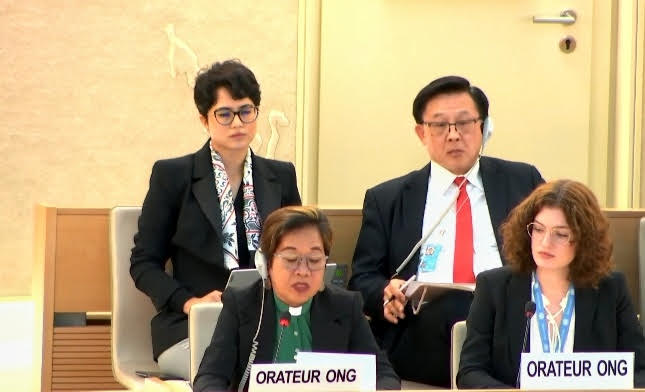GENEVA, Switzerland—A pastor of the United Methodist Church (UMC) in the Philippines delivered an oral statement at the ongoing 55th session of the United Nations Human Rights Council (UNHRC) in this city narrating harassment against her by the Philippine government.
At the UNHRC’s interactive dialogues on the report of the Special Rapporteur on the promotion and protection of human rights and fundamental freedoms while countering terrorism last Tuesday, March 12, Rev. Glofie Baluntong, former Mindoro UMC District Superintendent, told the body of the harassment she suffers under the Anti-Terrorism Act of 2020 (ATA, Republic Act No. 11479).
Rev. Baluntong said it all started on June 17, 2019 when the Philippine National Police forces barged into her church compound in Roxas, Oriental Mindoro without a court-issued warrant, demanding that she present the members of Karapatan Southern Tagalog whom she was hosting. She was then accused of aiding alleged rebels, she added.
“Since then, I have endured harassment, intrusive visits, and questioning by the Armed Forces (of the Philippines),” she revealed.
Rev. Baluntong, also a member of the National Council of Churches of the Philippines, also told the international body that she was subsequently faced attempted murder charges on August 18, 2021.
“[They cited] an armed encounter that allegedly occurred on March 25 of that year—a day on which I was conducting funeral rites for a departed church member,” Baluntong told the UN.
“I was also wrongfully charged with [violation of] the Anti-Terrorism Act of 2020, and grave threats from state forces have forced me to flee my town,” she added.
Baluntong said that on behalf of the World Council of Churches, they call upon UN member states, including the Philippines, to heed the recommendations of UN Special Rapporteur on counter-terrorism and human rights Ben Saul to ensure that counter-terrorism laws and practices, including efforts to combat terrorism financing, respect human rights.
Baluntong said that governments must make sure they do not curtail the legitimate activities of civil society organizations, impede civic space, or hinder humanitarian endeavours.
The clergy spoke at the debates on the submission of Saul’s report on the misuse of counter-terrorism measures and how these can infringe upon the rights of suspected individuals and imperil the liberties of the innocent.
“Saul’s report testifies to my own lived experience,” Baluntong said.
Increasing number of cases
Human rights group Karapatan, a member of the Philippine UPR (Universal Periodic Review) delegation attending the ongoing UNHRC session here said at least 91 individuals have been charged by the Philippine government of violating the ATA and Republic Act No. 10168 or the law on the prevention and suppression of terrorist financing. There are at least 27 political prisoners charged under both laws, Karapatan said.
“Charges under ATA against three political prisoners had been dismissed, but they remain in jail due to other trumped up criminal charges. Eight political prisoners who were detained and faced charges under Republic Act No. 11479 had been released,” Karapatan legal counsel Atty. Ma. Sol Taule said.
The constitutionality of the Philippine Anti-Terrorism Act of 2020 had been contested through several petitions before the Supreme Court. #
*Copy of Prof. Ben Saul’s report: Rampant abuse of counter-terrorism laws threaten human rights globally, warns UN expert

